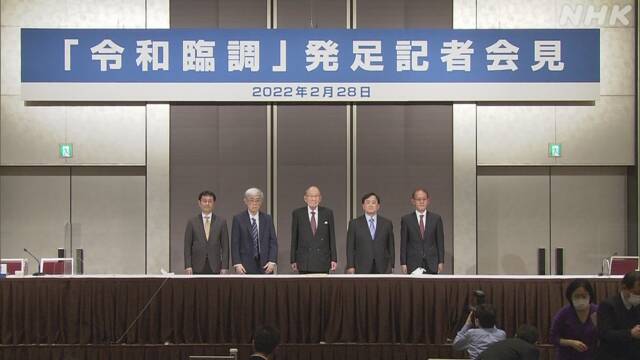In order to promote discussions for the creation of a post-corona society, the "Reiwa Rincho" will be launched by the business community, the labor community, and academic experts.
Our policy is to propose policies for issues such as politics, economy, and society.
This was announced at a press conference on the 28th by Yuzaburo Mogi, chairman of the Japan Productivity Center, who will be appointed as the co-representative of the "Reiwa National Conference", commonly known as "Reiwa Rincho", in which experts from various fields participate.
Among them, Mr. Mogi said that he would officially launch "Reiwa Rincho" before the upper house election in the summer, and said, "The purpose is to work on the long-standing structural reforms that have been postponed since the Heisei era. I would like to tackle issues that are difficult to solve unless the ruling and opposition parties work beyond their positions and factions. "
Approximately 80 people from the business world, labor world, and academic experts have been decided to participate in the "Reiwa Rincho", and three specialized subcommittees have been set up with the themes of "government structure," "finance and social security," and "national land concept." Therefore, we are planning to proceed with discussions for creating a post-corona society.
Then, while exchanging opinions with members of the Diet, the governor, the mayor of the municipality, and university students, we will make policy proposals on issues such as politics, economy, and society.
Mr. Mogi said, "The crisis of democracy is being called out all over the world. There is a tendency that extreme and sensational opinions and compliant opinions are fueling public opinion. We have to tackle the issues that have been postponed now. , I have a feeling that we may face a crisis in Japanese society and democracy. "
Discussion on 3 themes for a “post-corona” society
"Reiwa Rincho" is a policy to discuss the three themes of "government structure," "finance and social security," and "national land concept" toward the creation of a post-corona society.
"Government Organization"
The "Government Organization" will discuss political reforms since Heisei, such as the bicameral system and the Diet deliberations, the election system, the relationship between politics and bureaucrats, and the work style reforms of bureaucrats.
"Finance and social security"
"Fiscal and social security" includes fiscal policies to solve problems such as secular stagnation of economic growth and fixing of disparities, as well as a sustainable social security system based on the current severe financial situation. It is a prospect.
"National land concept"
The "National Land Concept" states that it will face the reality of population decline and super-aging, and pursue a new social image that emphasizes "human resource development" and "network development" that enable free and diverse lifestyles. increase.
Are you aware of diversity in the member composition?
The co-representatives of "Reiwa Rincho" are Yuzaburo Mogi, Chairman of the Japan Productivity Headquarters and Honorary Chairman of Kikkoman, Yoshimitsu Kobayashi, former Chairman of the Keizai Doyukai and Chairman of TEPCO, and Takeshi Sasaki, former President of the University of Tokyo. Hiroya Masuda, Chairman of the Japan Post Group, who has served as Governor of Iwate Prefecture and Minister of Internal Affairs and Communications, will serve as the four members.
Mr. Mogi and Mr. Sasaki also served as "co-representatives" in the predecessor "21st Century Rin".
On the other hand, among the specialized subcommittees established for each of the three themes, Reiko Akiike of the "Boston Consulting Group" in "Government Structure" and Yuri Okina, Chairman of "Japan Research Institute" in "Finance and Social Security", " Kumiko Bando, the former Commissioner of the Consumer Affairs Agency, will co-chair the National Land Initiative.
In addition, Shigeki Uno, a professor at the University of Tokyo, will be the chief examiner of the "National Land Initiative" subcommittee, one of the six people who were not appointed by the members of the Science Council of Japan.
In addition, Mr. Yu Kuwabara, the 35-year-old mayor of Tsunan, Niigata Prefecture, who became the youngest mayor in Japan four years ago, and a 32-year-old businessman who started a business while being forced to live in a wheelchair due to a bone disease. Mr. Toshiya Kakiuchi will also participate.
The composition of the members seems to be conscious of diversity.
In Heisei, there are also proposals for reform of the Diet and proposals for reform of the election system.
The predecessor of "Reiwa Rincho", "Private Political Rincho", was established in 1992.
In the year when it was inaugurated, in order to realize the policy debate between parliamentarians, the parliamentary reform called for stopping the bureaucratic response at the committee and introducing push-button voting in the plenary session. I have summarized the recommendations.
The following year, in 1993, over the election system of the House of Representatives, the medium-sized constituency system was abolished, and a reform plan centered on the introduction of the single-member constituency system was proposed. I showed a feeling.
After that, in 1999, it was restarted as "21st Century Admiration" in order to hold a wide range of discussions and recommendations, including the ideal state of the Constitution.
In the "21st Century Rise", in order to widely reflect the opinions of young people in national politics, the age at which voting rights are granted will be lowered to 18 years old, and for each political party, the House of Representatives election will support the financial resources of the policy and numerical targets. We have been proposing one after another to show the government's pledges and manifests that clearly state.

